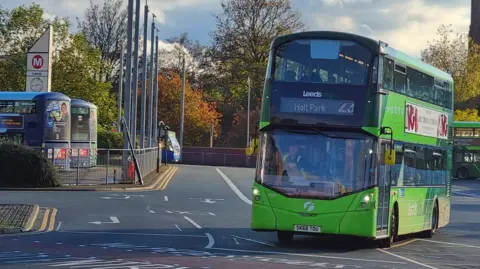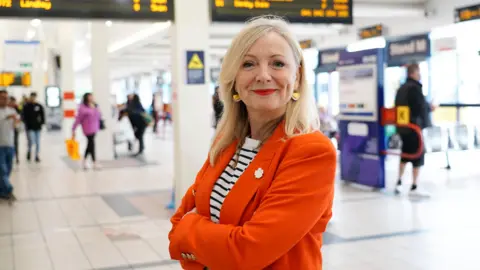Single bus fare cap could rise to £2.50 next year
 BBC
BBCThe single bus fare cap in West Yorkshire could rise by 50p to £2.50 next March, under plans unveiled by the region's mayor.
It means commuters would still have some of the lowest fares in the country, as nationally the Labour government is raising the cap to £3.
Tracy Brabin's plan is a continuation of the Mayor's Fares scheme which she introduced in September 2022 to help people with the rise in the cost of living.
Her proposals will be put to regional leaders for approval at a meeting of the West Yorkshire Combined Authority (WYCA) next month.
A DaySaver ticket for any bus and any number of journeys would rise from £5 to £6 next year.
Nationally, in last month's Budget, Labour said the single bus fare cap would rise to £3 next year.
That is an increase on the current limit of £2 which was introduced under the previous Conservative government to help with the cost of living.
That cap was due to expire at the end of December.
But the way buses are funded in West Yorkshire is structured differently - along with London and Greater Manchester.
The mayors have more control on how the money is spent.
In September 2022, West Yorkshire became the first area in England to introduce a £2 fare cap, with the government following suit in January 2023.
Earlier this year, the WYCA announced the £2 cap would continue until at least March 2025.
The WYCA said the £2.50 single fare cap and £6 DaySaver fares in West Yorkshire would continue from April until the end of 2025.
In comparison, single bus fares in London with Transport for London remain at £1.75 and those in Greater Manchester at £2.
'Devolution in action'
Earlier this month, the government announced the region would receive a £36m allocation to improve bus services.
Ms Brabin said the ability to control how much people paid to use buses was "devolution in action" and that it was a "privilege in a cost of living crisis" to prioritise bus fares.
She said she hoped by guaranteeing bus prices for 2025, people would be able to plan their commutes and budget for transport costs.
She said: "More affordable and simpler fares are the only way to get more people using public transport, reducing congestion, improving air quality and tackling the climate emergency.
“Improving our bus network and bringing it back under public control is central to our plan to build a greener, better-connected region that works for all.”
 WYCA
WYCACampaigners for better bus services have cautiously welcomed the news.
Matthew Topham, who campaigns for better public transport with the We Own it group, told the BBC the mayor deserved "praise for this initial step to insulate local passengers from the rising tide of prices".
But he said it "sadly falls short of the fares as low as £1.75 in regions with public control, like Manchester or London, or full public ownership, like Edinburgh".
Ms Brabin said she had continued the subsidy until the end of next year to provide people with security over how much their commute would cost.
Next year, she said she expected the Labour government to provide the results of the Spending Review in the spring, and further details of what the new Buses Bill would mean.
She said then she would be able to make plans for transport costs in West Yorkshire beyond 2025.
Listen to highlights from West Yorkshire on BBC Sounds, catch up with the latest episode of Look North or tell us a story you think we should be covering here.
